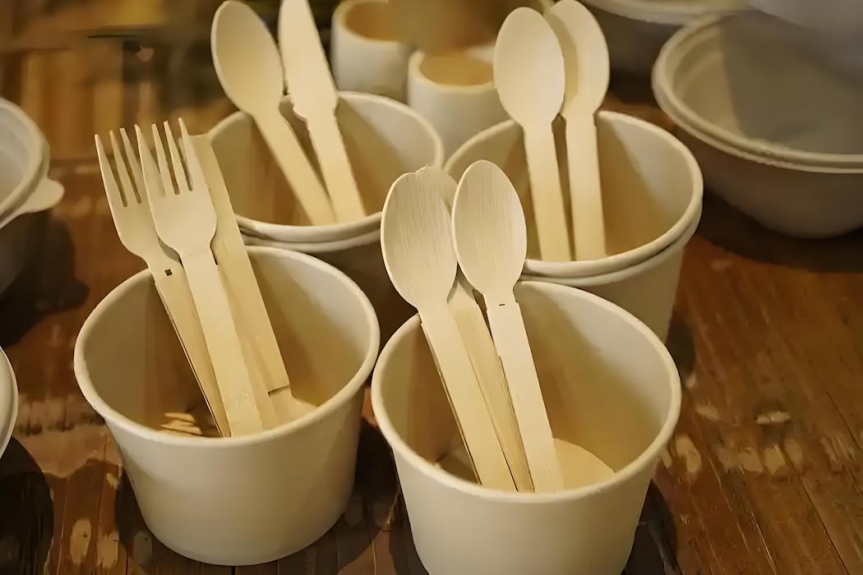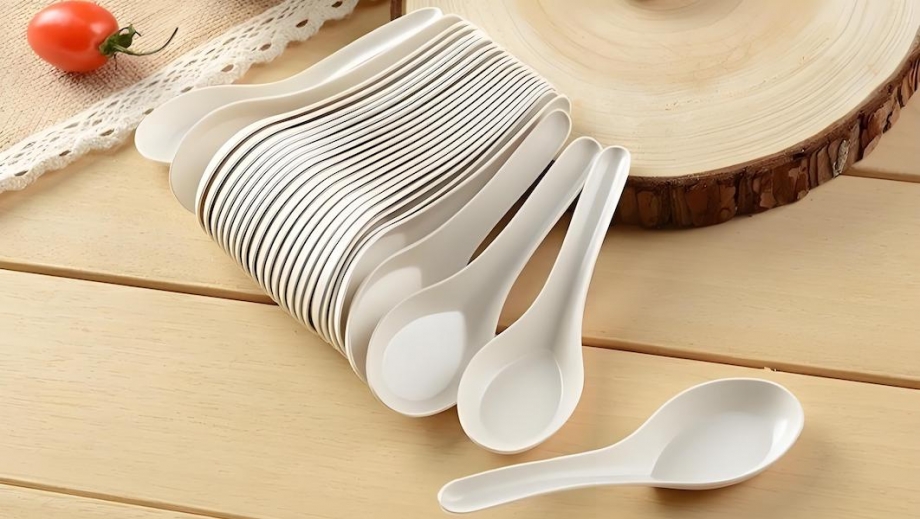In recent years, the conversation around sustainability has intensified, particularly in the realm of disposable cutlery. As consumers become more environmentally conscious, the choice between wholesale plastic forks and bamboo forks has emerged as a significant topic. This article delves into the eco-friendliness of these two options, examining their environmental impact, production processes, and overall sustainability. By exploring these aspects in detail, we can better understand the implications of our choices and their effects on the planet.
Understanding the Materials
Plastic Forks: Composition and Environmental Impact
Plastic forks are typically made from petroleum-based plastics, which are derived from non-renewable resources. The production of plastic involves extracting crude oil, which is then processed into various forms of plastic. This process not only consumes significant energy but also contributes to greenhouse gas emissions. The extraction and refining of fossil fuels are energy-intensive processes that release carbon dioxide and other pollutants into the atmosphere, exacerbating climate change.
Once used, plastic forks can take hundreds of years to decompose in landfills, leading to long-term environmental pollution. The durability of plastic, while beneficial for its intended use, becomes a liability when considering its environmental footprint. Additionally, many plastic utensils end up in oceans and waterways, posing a threat to marine life and ecosystems. Marine animals often mistake plastic for food, leading to ingestion that can cause injury or death. The accumulation of plastic waste in the oceans has created vast "garbage patches," disrupting marine habitats and threatening biodiversity.
Bamboo Forks: Composition and Environmental Benefits
Bamboo forks, on the other hand, are made from bamboo, a rapidly renewable resource. Bamboo grows quickly, often reaching maturity in just three to five years, making it a sustainable alternative to traditional wood and plastic. The cultivation of bamboo requires minimal water and no pesticides, further reducing its environmental impact. Unlike many crops, bamboo can thrive in a variety of soil types and climates, making it a versatile and resilient plant.
When disposed of, bamboo forks are biodegradable and can decompose within a few months, returning nutrients to the soil. This natural breakdown process contrasts sharply with plastic, highlighting bamboo's role in promoting a healthier ecosystem. The use of bamboo not only helps reduce waste but also supports soil health and encourages biodiversity. Furthermore, bamboo forests can act as carbon sinks, absorbing carbon dioxide from the atmosphere and helping to mitigate climate change.

Production Processes
The Manufacturing of Plastic Forks
The manufacturing process for plastic forks involves several steps, including the extraction of crude oil, refining it into plastic pellets, and molding these pellets into the desired fork shape. This process is energy-intensive and contributes to air and water pollution. The production facilities often emit volatile organic compounds and other pollutants, which can have detrimental effects on local air quality and public health. Furthermore, the disposal of plastic waste often leads to incineration, which releases harmful toxins into the atmosphere, contributing to air pollution and respiratory issues in nearby communities.
The reliance on fossil fuels for plastic production also raises concerns about resource depletion and energy security. As global demand for plastic continues to rise, the pressure on oil reserves increases, leading to potential geopolitical conflicts and economic instability. The environmental costs associated with plastic production and disposal are significant, prompting a reevaluation of its use in disposable products.
The Manufacturing of Bamboo Forks
In contrast, the production of bamboo forks is significantly less harmful to the environment. Bamboo is harvested, processed, and shaped into utensils with minimal energy consumption. The use of natural adhesives and finishes further enhances the eco-friendliness of bamboo products. Many bamboo manufacturers adhere to sustainable practices, ensuring that their sourcing does not contribute to deforestation or habitat destruction. By promoting responsible harvesting techniques, bamboo production can support local economies and empower communities.
Additionally, the processing of bamboo often involves less water and fewer chemicals compared to plastic manufacturing. This reduced environmental footprint makes bamboo a more sustainable choice for consumers. The growth of the bamboo industry also encourages the preservation of natural habitats, as bamboo can be cultivated without the need for extensive land clearing, thus protecting biodiversity.
Life Cycle Analysis
Environmental Impact of Plastic Forks
The life cycle of plastic forks begins with resource extraction and ends with disposal. Each stage contributes to environmental degradation, from the extraction of fossil fuels to the pollution caused by plastic waste. The longevity of plastic in landfills means that its environmental impact is felt for generations, making it a less favorable option for eco-conscious consumers. The persistence of plastic waste in the environment leads to soil and water contamination, affecting not only wildlife but also human health.
Moreover, the economic costs associated with plastic waste management are substantial. Governments and municipalities spend billions of dollars each year on waste collection, recycling programs, and cleanup efforts. The burden of plastic pollution often falls on taxpayers, highlighting the need for more sustainable alternatives. As awareness of these issues grows, consumers are increasingly seeking products that align with their values and contribute to a cleaner planet.
Environmental Impact of Bamboo Forks
Bamboo forks, however, present a more favorable life cycle. From cultivation to disposal, bamboo products are designed to minimize environmental harm. The rapid growth of bamboo allows for sustainable harvesting, and its biodegradability ensures that it does not contribute to long-term waste. This life cycle analysis positions bamboo as a superior choice for those seeking eco-friendly alternatives. The positive environmental impact of bamboo extends beyond its use as cutlery; it can also be utilized in various applications, including construction, textiles, and biofuels.
Furthermore, the cultivation of bamboo can provide economic opportunities for rural communities, promoting sustainable development and reducing poverty. By investing in bamboo production, we can support local economies while simultaneously addressing environmental challenges. This holistic approach to sustainability emphasizes the interconnectedness of social, economic, and environmental factors.

Consumer Preferences and Market Trends
The Shift Towards Sustainable Options
As awareness of environmental issues grows, consumers are increasingly seeking sustainable products. This shift is evident in the rising demand for bamboo cutlery, which is often marketed as a green alternative to plastic. Many restaurants and catering services are now opting for bamboo utensils to align with consumer preferences for eco-friendly options. This trend reflects a broader societal movement towards sustainability, where consumers are willing to pay a premium for products that align with their values.
The rise of eco-conscious consumerism has also led to increased transparency in product sourcing and manufacturing practices. Brands that prioritize sustainability are often rewarded with customer loyalty and positive brand recognition. This shift in consumer behavior is encouraging more businesses to adopt sustainable practices, creating a ripple effect throughout the industry.
The Role of Wholesale Suppliers
Wholesale suppliers play a crucial role in the availability of both plastic and bamboo forks. As businesses strive to meet consumer demand for sustainable products, many are expanding their offerings to include bamboo cutlery. This trend not only supports eco-friendly practices but also encourages manufacturers to adopt more sustainable production methods. By providing a platform for bamboo products, wholesale suppliers can help drive down costs and increase accessibility for consumers and businesses alike.
Moreover, the collaboration between suppliers, manufacturers, and retailers can foster innovation in sustainable product development. As the market for bamboo cutlery grows, there is potential for new designs and applications that further enhance its appeal. This collaborative approach can lead to a more sustainable future, where eco-friendly products become the norm rather than the exception.
Cost Considerations
Pricing of Plastic Forks
Plastic forks are generally less expensive to produce and purchase than bamboo forks. This cost advantage has made plastic the go-to option for many businesses, particularly in the food service industry. However, the long-term environmental costs associated with plastic waste may outweigh the initial savings. As consumers become more aware of the hidden costs of plastic pollution, the demand for sustainable alternatives is likely to increase.
Additionally, the economic implications of plastic waste management are significant. The costs associated with cleaning up plastic pollution, as well as the health impacts of plastic exposure, can lead to increased healthcare costs and reduced quality of life. As these factors come to light, businesses may find that investing in sustainable options like bamboo forks is not only environmentally responsible but also economically advantageous in the long run.
Pricing of Bamboo Forks
Bamboo forks tend to be more expensive due to the sustainable practices involved in their production. However, as demand increases and production methods improve, prices are expected to become more competitive. Businesses that prioritize sustainability may find that the higher upfront costs are justified by the positive environmental impact and consumer goodwill generated by using eco-friendly products. The willingness of consumers to pay a premium for sustainable options can create a viable market for bamboo cutlery, encouraging more businesses to make the switch.
Furthermore, the long-term benefits of using bamboo forks, such as reduced waste and improved brand reputation, can outweigh the initial cost differences. As more consumers seek out eco-friendly products, businesses that invest in sustainable alternatives may gain a competitive edge in the marketplace. This shift towards sustainability not only benefits the environment but also fosters innovation and economic growth.

Conclusion: Making the Right Choice
In the debate between wholesale plastic forks and bamboo forks, the evidence strongly favors bamboo as the more eco-friendly option. The sustainable nature of bamboo, combined with its biodegradability and minimal environmental impact, positions it as a superior choice for consumers and businesses alike. As the world continues to grapple with the challenges of plastic pollution and environmental degradation, making informed choices about disposable cutlery can contribute to a more sustainable future.
By opting for bamboo forks, individuals and businesses can play a part in reducing their ecological footprint and promoting a healthier planet. The transition to sustainable alternatives is not just a trend; it is a necessary step towards preserving our environment for future generations. In summary, while plastic forks may offer short-term convenience and lower costs, the long-term benefits of bamboo forks make them the preferable choice for those committed to sustainability. As we move forward, embracing eco-friendly alternatives like bamboo will be essential in our collective effort to protect the environment and foster a more sustainable world.
Frequently Asked Questions regarding Wholesale Plastic Forks
1. What are the main environmental concerns associated with plastic forks?
Plastic forks contribute to long-term pollution as they can take hundreds of years to decompose. They often end up in landfills and oceans, harming wildlife and ecosystems. The production process also involves significant greenhouse gas emissions due to the extraction and refining of fossil fuels.
2. How do bamboo forks compare to plastic forks in terms of biodegradability?
Bamboo forks are biodegradable and can decompose within a few months, returning nutrients to the soil. In contrast, plastic forks can persist in the environment for centuries, contributing to ongoing pollution and ecological damage.
3. Are bamboo forks more expensive than plastic forks?
Yes, bamboo forks tend to be more expensive due to the sustainable practices involved in their production. However, as demand increases and production methods improve, prices are expected to become more competitive.
4. What are the benefits of using bamboo forks for businesses?
Using bamboo forks can enhance a business's reputation as environmentally responsible, attract eco-conscious consumers, and potentially reduce waste management costs in the long run. Additionally, it aligns with the growing consumer demand for sustainable products.
5. Can bamboo cultivation contribute to local economies?
Yes, bamboo cultivation can provide economic opportunities for rural communities by creating jobs in harvesting, processing, and manufacturing. It promotes sustainable development and can help reduce poverty while supporting environmental conservation efforts.






